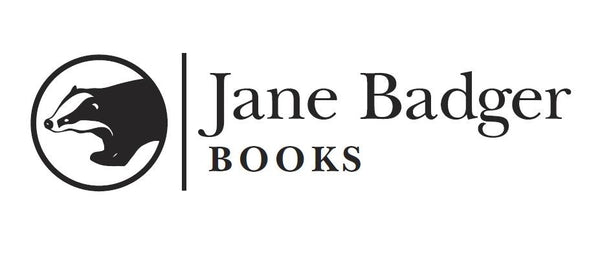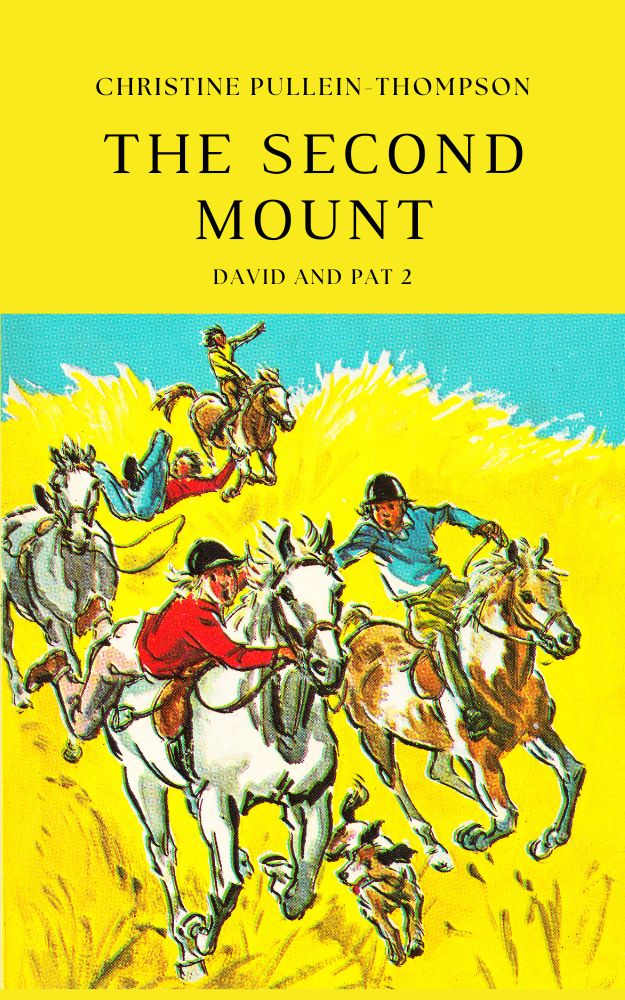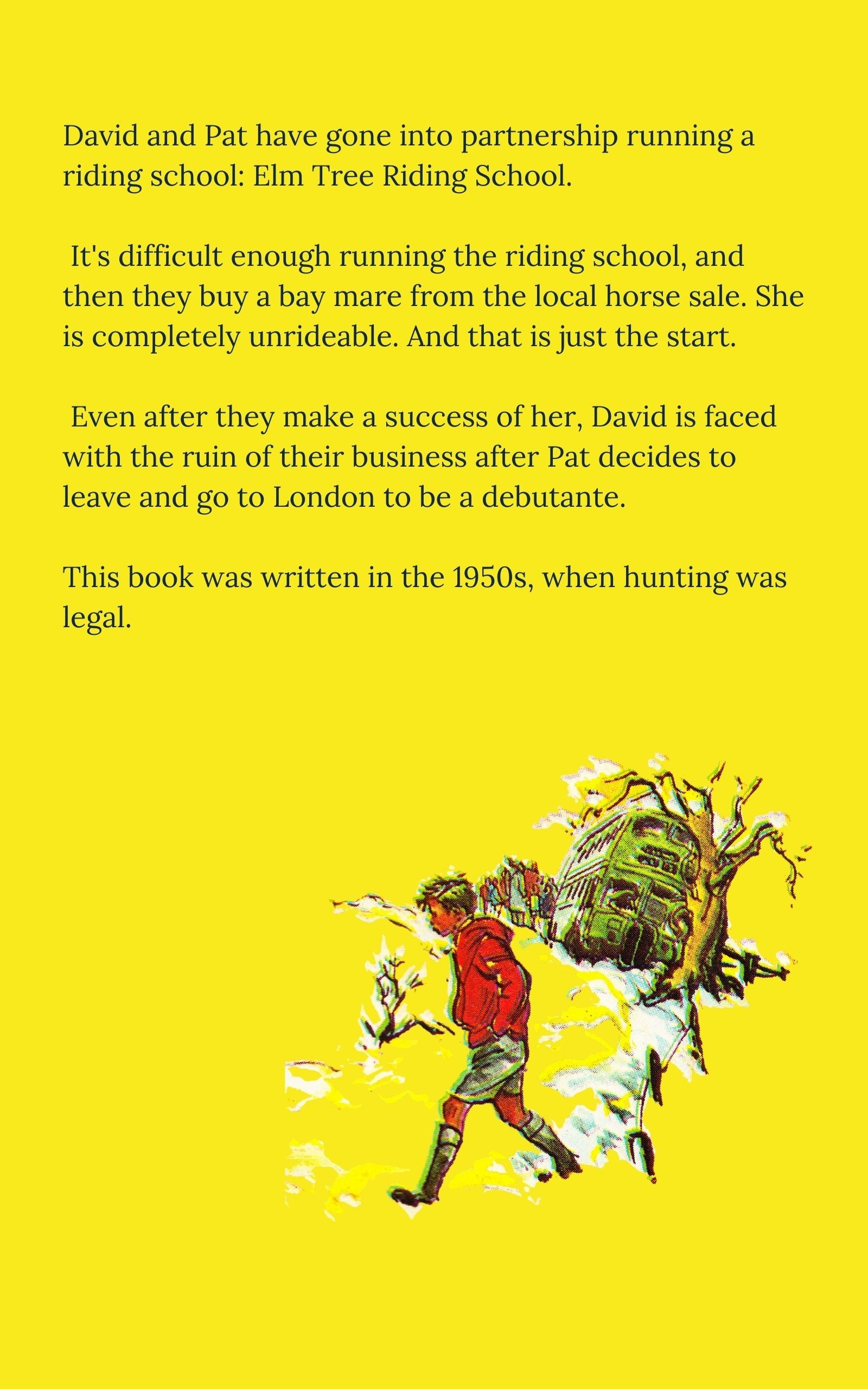Jane Badger Books
Christine Pullein-Thompson: The Second Mount (eBook - David and Pat 2)
Christine Pullein-Thompson: The Second Mount (eBook - David and Pat 2)
Couldn't load pickup availability
Share
David and Pat have gone into partnership running a riding school: Elm Tree Riding School.
It's difficult enough running the riding school, and then they buy a bay mare from the local horse sale. She is completely unrideable. And that is just the start. Even after they make a success of her, David is faced with the ruin of their business after Pat decides to leave and go to London to be a debutante.
This book was written in the 1950s, when hunting was legal.
David and Pat series 2
Page length: 156
Original publication date: 1957
How do I get my book?
How do I get my book?
There's a link to download in your confirmation email. If you need help, the email from Bookfunnel, who handle our delivery, will walk you through downloading the file that works best for you.
How do I read my eBook?
How do I read my eBook?
You can read the ebooks on any ereader (Amazon, Kobo, Nook), your tablet, phone, computer, and/or in the free Bookfunnel app.
Read a sample
Read a sample
“I DON’T call it a real job. Not a man’s job. All right for a girl like Pat with something behind her,” Mrs. Smith said.
David looked out of the small cottage window across the neat garden to Church Lane and the elms on the other side. He had always known deep down that his family wouldn’t like him going into partnership with Pat; not that she had all the money now, because he had managed to save more than one hundred pounds from the prize money he had won with Folly. But her father was Master of the local hounds; she lived in the Hall, and if she hadn’t preferred the idea of running a riding school with David, she would now be being groomed for a debutante season in London.
David had met Pat ages ago when they were both quite young. He had caught her pony when she had fallen off in the hunting field and she had invited him to tea at the Hall. He had found that she was lonely too, living alone with her parents. Later he had become kennel boy at the kennels, in exchange for a pony which had been Sinbad, but which later became Folly, a brown mare which he had jumped successfully at some of the biggest shows in the country.
He remembered all this as he stood in the little cottage kitchen which he knew and loved, while the kettle sang on the old black range, and a pile of washing lay in a chair waiting to be ironed. His mother was rolling out pastry on the plain, scrubbed table. Spring had come, and outside the birds were singing gaily of the summer still to come.
“But, Mum, if I take a job with horses I may never get anywhere. This is my big chance,” David said now.
She looked at the cups standing on the mantelpiece. She was tall, dressed in an overall, her grey hair pinned back behind her ears. “I’m only thinking of what’s best for you,” she said. “Your Dad doesn’t mind. He says you’re to do what you want, what you’ve always done; like the others,” she added, remembering her other two sons, who had both won scholarships to Cambridge, and Susan, who was now a secretary earning ten pounds a week.
“It’s all right, then?” he asked before he went whistling into the garden, down Church Lane, across the Common which held so many memories, to the Hall. Pat was in the stables grooming her fourteen-two pony, Swallow.
“Hullo. What luck?” she called as David came up the drive.
She had blue eyes and chestnut hair; she was generally laughing, though sometimes she would be overwhelmed by a fit of gloom which would make her silent and depressed. Like David, she was just sixteen. In the autumn she would be leaving school. For years she had planned this riding school with David; from the moment she had heard that the Lane Riding School was giving up she had said, “Why don’t we teach? We can start with tots at the week-ends.”
David had been against it for a long time; he hadn’t felt that they were good enough to teach riding; now, with several years of success in the show jumping world behind him, he felt slightly, but only slightly, more confident.
“It’s all right,” he said, now joining Pat in the loose box. “But we must make a success of it. I shall never live it down if we don’t.”
The boys at his school had nicknamed him “The Toff” long ago. Most of them were already in jobs, driving delivery vans, working in shops, on farms, in factories, taking a pound home to their mothers every week. They had laughed at David when he told them he was going into the riding school business. Like his mother, they didn’t think he would get anywhere. He hadn’t even told Pat some of the things they had said.
“Of course we’ll succeed,” Pat said. “After all, we’ve made quite a bit already teaching at week-ends.”
“But we haven’t paid rent; and your father’s been paying for Folly’s keep.”
David was insisting that they paid rent to Colonel Lewisham for the six loose boxes they planned to use, also for the field in front of the house. He didn’t want to be indebted or beholden to anyone.
They sat in Swallow’s box and started to make plans, and to both of them it was a dream coming true.
“We’ll have Mistletoe for the beginners, and Folly and Swallow for the experts. But what about the middle ones?” asked Pat.
“We’ll have to buy something,” said David.
“We’ll need some more tack too,” Pat added.
“We’ll open on the first day of the summer holidays, don’t you think?” asked David.
He was finishing his last term at school; by August he would be free, independent; in front of him seemed to stretch endless opportunities; often he would lie in bed thinking about them, wondering, ‘Am I doing the right thing? Am I being fair to Mum?’ But, whatever happened, he knew that his life was bound up with horses; nothing could alter that now. He was what his family called “horse mad,” and always had been as far back as he could remember.
They went on planning.
“We’ll advertise in the ’buses. It isn’t very expensive. Advertising is the great thing. If people know we exist, they’ll come all right,” David said.
“We need a new set of jumps,” Pat told him.
“I’ll make those between now and the holidays,” David said.
“We ought to contact all the local schools. They might like to include riding in their curriculum.”
“We should be writing all this down,” David said.
“We must mark out a school. We’ll need dressage markers. Oh, isn’t it all exciting? I never really thought it would happen, did you?” cried Pat.
David’s doubts always faded when he was with Pat.
“It’s marvellous,” he cried now. “But we really must make up our minds about a name. We can’t even think about the sign until we know what it is called.”
“It’ll have to have a horse on it. The Hall Riding School sounds so dull, doesn’t it?” asked Pat.
“Yes; it does rather,” David agreed.
They leaned against the loose box door and thought, while Swallow peacefully chewed hay, and in the distance they could hear the lawn at the Hall being mown for the first time since the winter.
“I can’t think of anything. Did your parents really mind?” asked Pat at last.
“Mum did a bit at first,” David admitted. “She doesn’t think teaching is a man’s job.”
“But it’s only a stepping-stone, isn’t it?” Pat asked. “I mean, in the end you mean to jump for England.”
“Yes,” David replied doubtfully, and that day seemed very far away. He brushed back his dark hair, which was always falling like a forelock across his face, so that Susan, who was inclined to be refined, often said, “Oh, David, your hair! Why don’t you plaster it with Brylcream or something.” He looked across the stableyard and thought, ‘Shall I ever be any good? Shall I ever own a tip-top show jumper of my own? Most of all, shall I ever ride with a Union Jack under my saddle?’
Pat seemed to read his thoughts, for she said, “I’m sure you’ll make it. You’re one of those people who always does in the end.”
“You’re such an optimist,” replied David.
“Well, I was right last time,” she said; and he remembered how determined he had been, when he was ten, to win at all the shows, and how Pat had believed in him and how everything had turned out all right in the end.
It was nearly the end of the holidays. April had come in like a lion, so that everyone had been muddled and thought it was still March. Now she was going out gently with sun and showers and many-coloured rainbows. David dreaded his return to school. Most of his friends had gone on to the Grammar School long ago; he didn’t fit in with the remaining boys. He and his brothers had a reputation for getting on in the world, which caused a great deal of spite.
“Horse and Hound’s in the saddle-room. Shall we look at it?” asked Pat.
The saddle-room smelt of soap and leather; it shone with gleaming bits and stirrups; it was a second home to David. They sat on a chest full of rugs and looked through “Horses for Sale.” They marked one or two which might be suitable. They weren’t sure what they were looking for.
“Something small and quiet,” David said.
Who's in the book?
Who's in the book?
Humans: David Smith, Mr and Mrs Smith, Pat Lewisham, Colonel Lewisham, Mrs Lewisham, Bert, Mr Austin, John, Julia, Judy
Equines: Swallow, Sinbad, Folly, Suzy, Tornado
Other titles published as
Other titles published as
Series order
Series order
1. The First Rosette
2. The Second Mount
3. Three to Ride
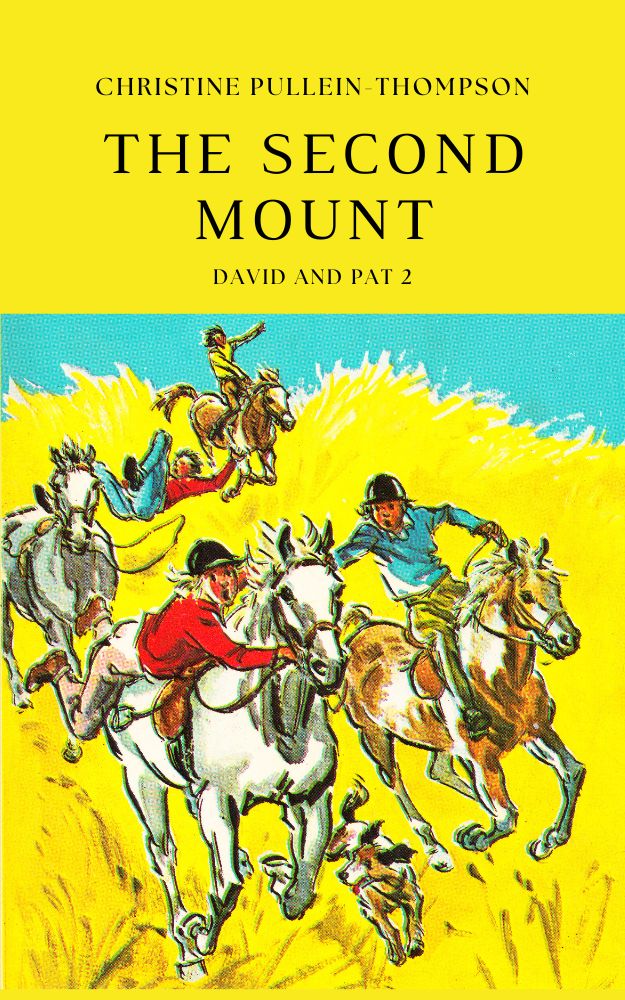
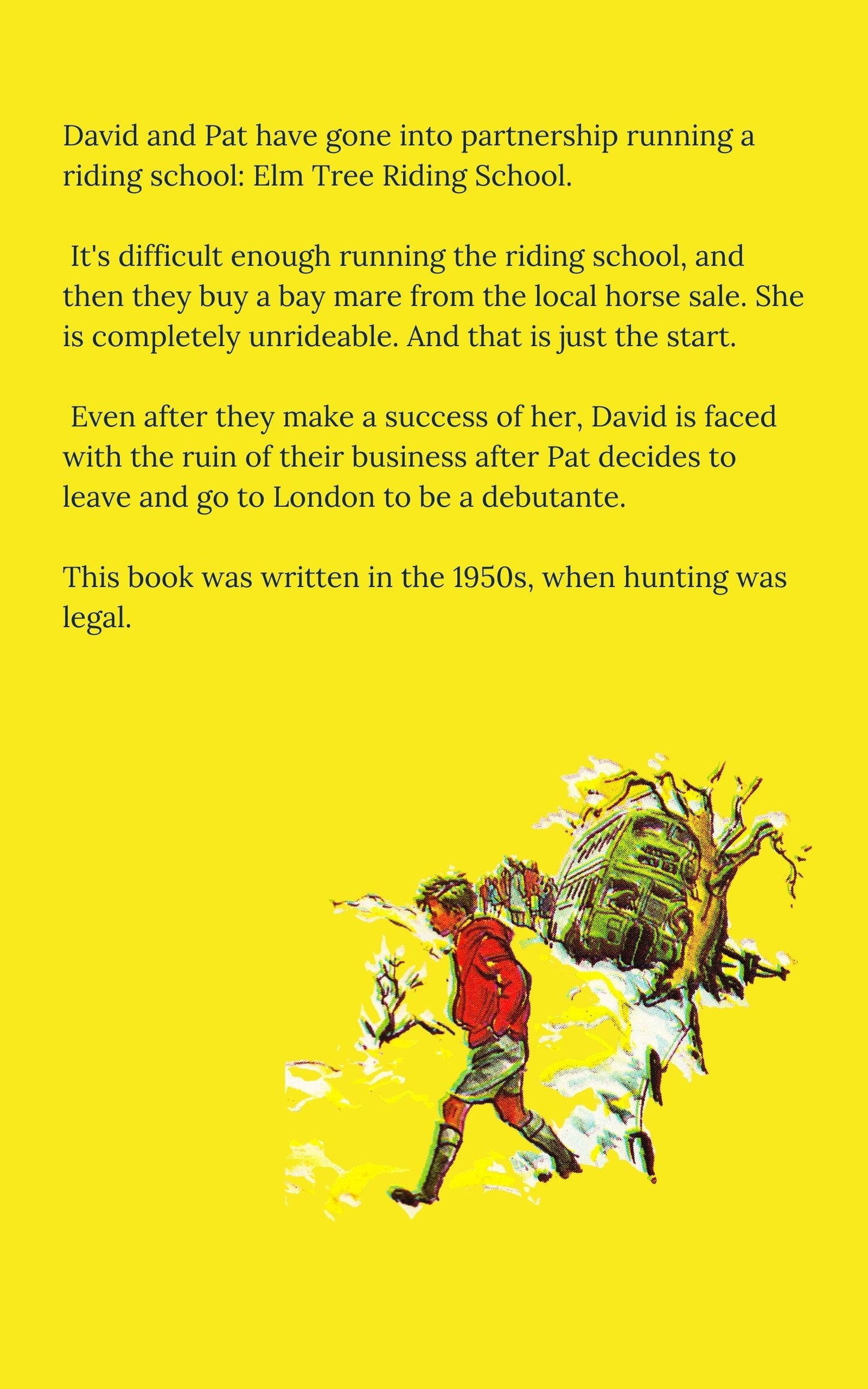
Enjoyed this book, couldn’t stop reading it until I finished it. Thank you
